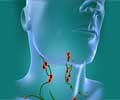- Lymphoma - (https://www.mayoclinic.org/diseases-conditions/lymphoma/symptoms-causes/syc-20352638)
About
Lymph node cancer, also known as lymphoma, is a condition that affects the lymphatic system, a crucial part of the immune system.
Understanding the basics of lymph node cancer is essential. Lymphoma affects lymphocytes, a type of white blood cell crucial for immune function. The lymphatic system is spread throughout the body, and lymph nodes play a pivotal role in filtering and trapping harmful substances(1✔ ✔Trusted Source
Lymphoma
Go to source).
The Varieties of Lymphoma
Lymphoma is broadly classified into two main types:
Each type has distinct characteristics and requires different treatment approaches. Understanding the type of lymphoma is crucial for effective management.
Common Lymph Node Cancer Symptoms
Recognizing the symptoms is crucial for early detection. Common signs include:
- Enlarged Lymph Nodes: Enlarged, painless lymph nodes are a hallmark symptom. They may be felt under the skin in areas like the neck, armpits, or groin.
- Fatigue: Unexplained fatigue is often associated with lymphoma. Persistent, unexplained tiredness should not be ignored.
- Fever and Sweats: Fever, especially during the night, and drenching sweats can be indicative of lymphoma.
- Unexplained Weight Loss: A sudden and unexplained weight loss can be a red flag for various cancers, including lymphoma.
Risk Factors for Lymph Node Cancer
Certain factors may increase the risk of developing lymphoma. These include:
- Certain types of lymphoma are more common in specific age groups or genders.
- A family history of lymphoma or other cancers may contribute to an increased risk.
- Conditions or treatments that weaken the immune system may elevate the risk.
Upon consultation, healthcare providers may recommend various diagnostic tests, such as imaging studies and biopsies, to confirm the diagnosis. Treatment options may include chemotherapy, radiation therapy, immunotherapy, or a combination tailored to the specific type and stage of lymphoma.
Lymph node cancer symptoms should not be ignored. Increased awareness of the signs, risk factors, and the importance of seeking timely medical advice is vital for early detection and effective management.
By understanding lymphoma and staying informed, individuals can take proactive steps toward maintaining their health and well-being. Remember, knowledge is a powerful tool in the journey towards prevention and recovery.
Disclaimer: Prompt medical attention is crucial. If experiencing persistent symptoms or noticing unusual changes in the body, it is essential to consult a healthcare professional. Early diagnosis enhances the chances of successful treatment and recovery.









